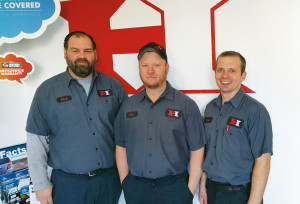 With the average auto repair frequency having gone down, from an average of 80 repairs per 100 vehicles in 1980, to about 35 per 100 vehicles today, motorists who employ good preventive maintenance practices cut this number even further.
With the average auto repair frequency having gone down, from an average of 80 repairs per 100 vehicles in 1980, to about 35 per 100 vehicles today, motorists who employ good preventive maintenance practices cut this number even further.
While today’s vehicles are much more reliable than ever before, preventive maintenance does actually prevent future repairs. Just as changing your oil prevents engine damage, changing other vital fluids on your vehicle will help protect and lengthen the life of those components.
All vehicles use some type of transmission fluid, whether it is standard, automatic or continuously variable transmission, also referred to as CVT transmission. The fluid not only lubricates, but also helps the transmission to disperse heat. As the fluid ages, it will become contaminated from heat and debris from normal wear and tear. We recommend transmission fluid service every 30,000 miles. This will help protect against a costly transmission repair.
Rear-wheel and four-wheel drive vehicles will be equipped with differentials and transfer cases. These components also rely on fluids to lubricate and protect their inner workings. Changing these fluids at recommended intervals is vital to prevent damage. Depending on vehicle use, these intervals will vary. We will help you set a schedule, which will meet your driving needs.
If your vehicle uses a hydraulic steering system, changing your steering fluid every 24,000 miles will help prevent leaks and failures.
Unlike the engine, the steering system actually uses the fluid under high pressure to operate. The steering pump creates the pressure, and when you turn your steering wheel, the pressure is directed to the steering gear, which makes the wheels turn. Over time, the fluid collects contaminants from the system, and this is what leads to leaks and premature part failures.
Brake fluid is unique because it is the only fluid that is hydroscopic. This means the fluid retains moisture. The moisture content will cause the fluid to have a lower boiling point and also create sealing failures. The result is a braking system that feels soft and can cause calipers and wheel cylinders to fail. Brake fluid should be changed every two years.
Besides fluids, vehicle performance should be maintained by spark plug changes, filter replacements and fuel system cleanings. Filters should be changed every 15,000 miles. These include engine air, AC cabin air and fuel filters, if equipped. Fuel systems should be cleaned every 30,000 miles.
Fuel combustion will leave carbon residue inside the engine. Over time, the carbon builds up and robs performance. Carbon buildup also can lead to emissions issues and a check engine light. Spark plugs have different replacement intervals, depending on their material. Copper plugs should be changed every 30,000 miles, but Iridium plugs can go 100,000 miles before replacement.
H and I Automotive, located at 5338 E. Main St., has been serving this community since 2009. We have more than 75 years of combined automotive experience in our desert environment. We will assist you with keeping your vehicle safe and reliable. Statistics show a well-maintained vehicle will cost you 10 fewer cents per mile than a non-maintained vehicle.
Call us at (480) 985-9279, or visit our website at handiautomotive.com.

